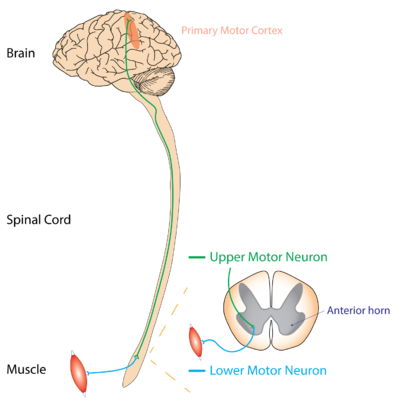
Hardly ever occurring motor neurone disease slowly damages numerous locations of the nervous system. This causes weakened muscles that frequently reveal evident wasting.
A problem called motor neurone disease, commonly referred to as amyotrophic lateral sclerosis (ALS), develops when specialised afferent neuron called motor neurones in the brain as well as spinal cord quit functioning appropriately. We call this neurodegeneration.
Motor neurons, such as: control the important muscle activity
strolling
swallowing
gripping
breathing
talking
Some or every one of these taks with be increasingly difficult as their condition intensifies. They may eventually develop into unfeasibilities.
What stops motor neurones from functioning appropriately is uncertain. History in the family of motor neurone disease or related disorder frontotemporal dementia occurs in roughly 5% of cases. Family background of motor neuron disease is what creates this. Most of these scenarios, it has been figured out that defective genes play a substantial function in the development of the problem.
Will I have motor neurone disease if my mother does?
Motor neurone disease can not be identified with a solitary test; instead, a mind and also nervous system expert must make the last determination (a specialist). An experienced neurologist can normally make the medical diagnosis of motor neurone disease with little to no doubt. Still, sometimes specialised testing is called for to rule out various other problems that share some of the exact same signs.
About 10% of those detected with MND have the "familial" type of the disease, implying that more than one relative is or has actually been influenced. The continuing to be 90% of MND victims are the only participants of their family who are afflicted and thus are considered to have "sporadic" MND. Many MND clients have the erratic type of the disease, which is neither acquired or hereditary and does not run in family members.
The acquired type of MND can be passed down to subsequent generations, which implies that it may eventually impact numerous member of the family. Individuals that have this kind of MND have inherited a blunder in among their parents' hereditary directions. This error referred known as a anomaly, influences exactly how the gene that carries it functions. Each child of a individual that carries a genetic anomaly connected to MND has a 50/50 opportunity of obtaining the anomaly also.
We can rapidly test for mistakes in the four most widespread genes in MND individuals that also have a close loved one that has the disease (referred to as having a " family members history" of MND). These genetics are C9orf72, SOD1, FUS, as well as TARDBP, respectively. Greater than 20 other genetics have actually been linked to MND recently. Nonetheless, they are all very rare and also do not yet have regular screening choices. Mental deterioration in relative is more probable in those with a defective C9orf72 gene (FTD).
Hereditary Evaluating and also MND Household History
Every genetics exists in 2 duplicates in each people. One in two people that carry a gene problem that triggers MND have a 50% possibility of passing the defect on their children. Nevertheless, the likelihood that somebody with the malfunctioning genetics would get MND may sometimes be much less than 50%. Individuals with malfunctioning genes might however live lengthy lives and also pass away from more typical diseases without creating MND or FTD. As a result of the capacity for unwarranted anxiety, we do not recommend testing family members who do not display any kind of MND signs.
When thinking about having children and having a relative with MND, some people might like to evaluate their embryos for the defective gene to ensure that only those without the defective genetics are implanted. It calls for artificial insemination fertilisation (IVF). Nevertheless, given the peculiar nature of this circumstance, a detailed conversation with a hereditary counsellor is required. It is critically important to bear in mind that MND won't likely continue to be challenging to handle. Anybody born today will certainly almost certainly live a long period of time with the possibility of treating or perhaps stopping diseases like MND. If you want genetic testing, you'll require a prescription from your physician specifying that you need it due to the fact that MND runs in your family members. Individuals with a family background of MND or dementia can receive reduced- or no-cost hereditary screening via their neighborhood public health and wellness company (Medicare must cover it; nevertheless, there is commonly a waitlist for these services).
Conversely, you can arrange testing independently with facilities like Sydney's Macquarie Neurology and also spend for the exams (the first appointment with Macquarie is covered by Medicare, as long as gone along with by a valid reference from your GP).
MND-causing genes can be acquired
About 70% of the genetics known to generate a household history of MND are still unidentified to us. With hereditary MND, one of the most frequent hereditary mistakes are:
C9ORF72, which was determined in 2011 and also represented around 40 in 100 instances,
SOD1, which was recognized in 1993 as well as made up 20 in every 100 instances
TARDBP (TDP-43), which makes up as much as 5 in 100 cases, was discovered in 2008.
FUS, which accounts for approximately 5 in 100 instances and also was found in 2009,
In addition, other exceptionally rare genetics that might trigger MND have been recognized, and also these findings offer critical hints regarding just how motor neurones are damaged in MND. This developments our expertise of the disease in all its forms.